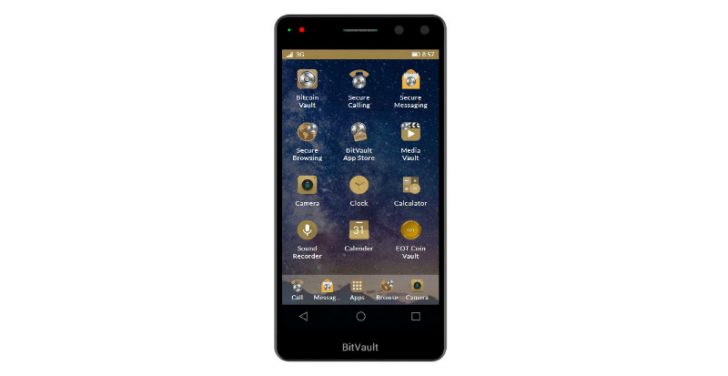
Embedded Downloads – based in Limerick, Ireland and New Delhi, India – has announced BitVault, allegedly the world’s first crypto communicator and blockchain-supporting smart phone. It will ship in November at a price of €949.00. The BitVault was introduced, via prototypes, to the fintech community earlier this year. Now it is almost real.
BitVault features – part 1
According to the company, the BitVault will arrive with multiple ‘unique’ features. These include:
- dynamic key creation: by combining biometric identification with NFC, users will create private and public keys every time the device is used; furthermore, the device never stores these keys which it uses for encryption of transactions, communication and other applications on the device.
- secure calling: Bitvault exploits cryptography to enable public key to public key calling; crypto currency transactions create multi-layer encryptions
- secure messaging: BitVault to BitVault messaging has multi-layered encryption (it uses the same cryptographic methods as for secure messaging)
- secure document Transfer: when a user sends a document created on a laptop or a PC via the BitVault, these documents transfer over a private blockchain separate from the BitVault communication environment; both sender and receiver will need to download an application on their respective computers to send or receive documents and the keys to open them will transmitt securely from BitVault® to BitVault.
The importance of the latter is that outside documents never ‘enter’ the BitVault communication environment. This keeps them safe from malware.
BitVault features – part 2
Three more features illustrate the use of blockchain technology in the smartphone:
- secure browsing: by using blockchain technology the BitVault dynamically verifies websites through a set of confirmation steps; this restricts and controls browsing with the BitVault and applies stringent rules to ensure environment integrity
- cryptocurrency wallets: the BitVault comes with native cryptocurrency wallets, including for Bitcoin, Ethereum, Bitcoin Cash and EOT
- the BitVault Application Store, which is a dedicated application store open to outside developers.
For applications the BitVault secures and modifies Android. But users cannot upload standard Android applications onto the BitVault – they will not work. BitVault developers must obtain licenses and will then receive a developer toolkit which enables BitVault application development.
What does it mean
Embedded Downloads specializes in secure hardware and software. In the context of blockchain it claims experience in creating private blockchains as well as with blockchain messaging, storage and website verification. The involvement with BitVault appears to build on this knowledge. (It is not the only developer to consider blockchain and smartphones: ClearPoll is another recent example.)
The launch price of does not seem outrageous, given the recent pricing of the Samsung Note 8 and Apple iPhone X along with the wealth of security features. The phone possesses reasonable specs (5.5 Inch Touch Screen, 64 bit 2.0GHz Octa Core Processor, 4GB RAM, 64GB Flash Storage, 4G LTE, WiFi, Bluetooth, 13MP Back camera and 8MP front camera.
The big question is will all that blochchain technology:
- work (it may overwhelm the user)?
- appeal to users (the inability to run standard Android apps will frustrate many)?
- appeal to enterprises (the enhanced security will need comparison to Knox, etc)?
- attract developers, both enterprise ones and independents (how easy the SDK will be to exploit will matter)?
One last thought. With all your BTCs and other cryptocurrencies loaded in your BitVault wallet, you really don’t want to lose the phone – or drop it in the swimming pool.


























